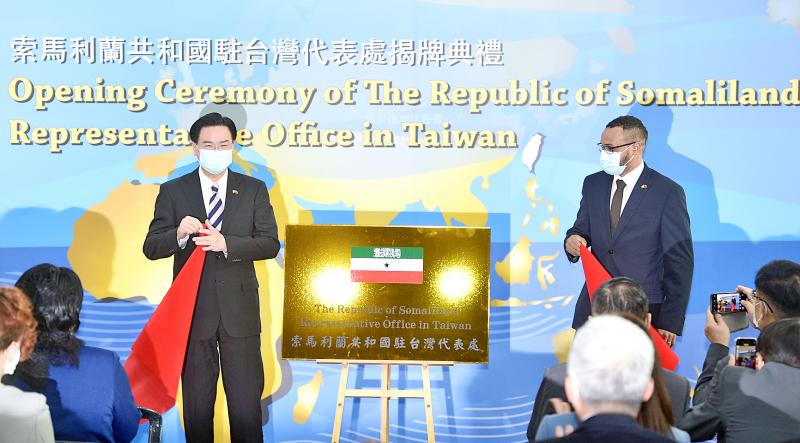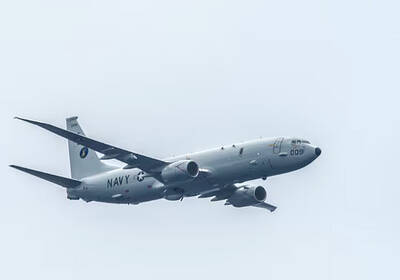The Republic of Somaliland Representative Office in Taiwan was yesterday inaugurated by Minister of Foreign Affairs Joseph Wu (吳釗燮) and Somaliland Representative to Taiwan Mohamed Omar Hagi Mohamoud, with both emphasizing the nations’ common values of freedom and democracy, and cooperation on trade and energy sources.
The Taiwan Representative Office in Somaliland was opened in Hargeisa on Aug. 17. It is the nation’s only embassy that has “Taiwan” in its English name.
While Taiwan and Somaliland do not have diplomatic relations, the announcement in July of the planned representative offices brought condemnation from China and Somalia, with each saying that their territorial integrity is indivisible.

Photo: George Tsorng, Taipei Times
Taiwan and Somaliland have since 2009 collaborated on healthcare, education and maritime security, and the new office’s opening marks a new chapter in bilateral relations, Wu said, naming fisheries, energy and agriculture among the areas targeted for cooperation.
The two nations “share a commitment to safeguarding the values of freedom, democracy, justice and the rule of law,” he said. “We both face external pressures, but we are proud of our sovereignty and ready to defend it.”
“From now on, Taiwan is your second home,” Wu told Mohamoud and diplomatic personnel from Hargeisa.
In his speech, Mohamoud described Somaliland-Taiwan ties as a special and historic relationship between “two champions of democracies in Africa and Asia.”
Somaliland is a free, democratic, independent and sovereign nation, that has established bilateral relations with many other countries in Africa, North America, Europe and Asia, he said.
The path to a more prosperous world is through dialogue and cooperation, not through the pursuit of a foreign policy that infringes on the affairs of other nations and sows the seeds of division, he added.
The Somaliland government is encouraging international investment through incentives such as tax exemptions and land leases, he said.
The nation’s resources of hydrocarbon deposits, coal, gemstones and industrial minerals are worth the investment, he said, adding that seismic surveys have indicated potential oil and gas deposits in the nation.
Ecotourism is another potential area for investment, with visitors encouraged to explore ancient caves, beautiful beaches and mountains, and spectacular landscapes, he added.
Somaliland President Muse Bihi Abdi sent his best wishes in a prerecorded video.
“With the global economy shifting, and the Horn of Africa, the Red Sea and the Gulf of Aden becoming focal points of international interest, we believe that it is time for Somaliland to initiate efforts to strengthen relations in areas of common interest that may promote bilateral trade and economic cooperation among equals with your country and all other nations in the world,” he said. “The bilateral accord of our two countries is based on our common values of freedom and democracy. It is a spirit of mutual assistance that will never expose any harm whatsoever to the interests of other countries, but rather contributes to international peace and regional economic activities.”
The Somaliland office is on Ningbo W Street in Taipei’s Zhongzheng District (中正), although yesterday’s ceremony was held at the Ministry of Foreign Affairs’ Institute of Diplomacy and International Affairs, reportedly due to the office’s limited space.

ROLLER-COASTER RIDE: More than five earthquakes ranging from magnitude 4.4 to 5.5 on the Richter scale shook eastern Taiwan in rapid succession yesterday afternoon Back-to-back weather fronts are forecast to hit Taiwan this week, resulting in rain across the nation in the coming days, the Central Weather Administration said yesterday, as it also warned residents in mountainous regions to be wary of landslides and rockfalls. As the first front approached, sporadic rainfall began in central and northern parts of Taiwan yesterday, the agency said, adding that rain is forecast to intensify in those regions today, while brief showers would also affect other parts of the nation. A second weather system is forecast to arrive on Thursday, bringing additional rain to the whole nation until Sunday, it

CONDITIONAL: The PRC imposes secret requirements that the funding it provides cannot be spent in states with diplomatic relations with Taiwan, Emma Reilly said China has been bribing UN officials to obtain “special benefits” and to block funding from countries that have diplomatic ties with Taiwan, a former UN employee told the British House of Commons on Tuesday. At a House of Commons Foreign Affairs Committee hearing into “international relations within the multilateral system,” former Office of the UN High Commissioner for Human Rights (OHCHR) employee Emma Reilly said in a written statement that “Beijing paid bribes to the two successive Presidents of the [UN] General Assembly” during the two-year negotiation of the Sustainable Development Goals. Another way China exercises influence within the UN Secretariat is

CHINA REACTS: The patrol and reconnaissance plane ‘transited the Taiwan Strait in international airspace,’ the 7th Fleet said, while Taipei said it saw nothing unusual The US 7th Fleet yesterday said that a US Navy P-8A Poseidon flew through the Taiwan Strait, a day after US and Chinese defense heads held their first talks since November 2022 in an effort to reduce regional tensions. The patrol and reconnaissance plane “transited the Taiwan Strait in international airspace,” the 7th Fleet said in a news release. “By operating within the Taiwan Strait in accordance with international law, the United States upholds the navigational rights and freedoms of all nations.” In a separate statement, the Ministry of National Defense said that it monitored nearby waters and airspace as the aircraft

Taiwan’s first drag queen to compete on the internationally acclaimed RuPaul’s Drag Race, Nymphia Wind (妮妃雅), was on Friday crowned the “Next Drag Superstar.” Dressed in a sparkling banana dress, Nymphia Wind swept onto the stage for the final, and stole the show. “Taiwan this is for you,” she said right after show host RuPaul announced her as the winner. “To those who feel like they don’t belong, just remember to live fearlessly and to live their truth,” she said on stage. One of the frontrunners for the past 15 episodes, the 28-year-old breezed through to the final after weeks of showcasing her unique